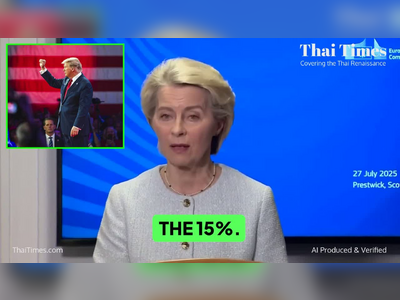Thai Baht Declines as Dollar Strengthens Following Trump Victory
US Dollar Surge Affects Asian Currencies Amid Speculations on Federal Reserve's Interest Rates
The Thai baht is experiencing a decline against the US dollar, reaching a two-month low following Donald Trump's success in the US presidential election on November 5, 2024.
The baht was quoted at 34.34-36 to the dollar on Thursday, a drop from its previous close of 34.17.
Kasikorn Research Center (K-Research) suggests that the baht may fall below 34.5 in the short term, influenced by a continuous decline of the yuan and the broader strengthening of the dollar.
Kanjana Chockpisansin, head of research at K-Research, notes signs of funds flowing out of the Thai bond market as US bond yields rise.
This increase is partly due to expectations that the new Trump administration will engage in significant economic stimulus, potentially requiring bond issuance to support spending.
Investors are buying US dollars, having adjusted their expectations for Federal Reserve interest rate cuts.
Although the market anticipated a further policy rate cut of 1 percentage point by the end of 2025, Ms. Kanjana predicts a 25bps cut could occur soon, with further reductions contingent on economic conditions.
Rakpong Chaisuparakul of KGI Securities (Thailand) believes the baht's depreciation may continue short term but anticipates a market refocus on US economic fundamentals.
The Fed fund futures suggest a Fed policy rate reduction to 4.50% by the end of 2024, with potential further cuts in 2025.
Economists at KGI maintain a forecast of a 100bps reduction in 2025, anticipating a possible cyclical slowdown in the US economy.
The baht was quoted at 34.34-36 to the dollar on Thursday, a drop from its previous close of 34.17.
Kasikorn Research Center (K-Research) suggests that the baht may fall below 34.5 in the short term, influenced by a continuous decline of the yuan and the broader strengthening of the dollar.
Kanjana Chockpisansin, head of research at K-Research, notes signs of funds flowing out of the Thai bond market as US bond yields rise.
This increase is partly due to expectations that the new Trump administration will engage in significant economic stimulus, potentially requiring bond issuance to support spending.
Investors are buying US dollars, having adjusted their expectations for Federal Reserve interest rate cuts.
Although the market anticipated a further policy rate cut of 1 percentage point by the end of 2025, Ms. Kanjana predicts a 25bps cut could occur soon, with further reductions contingent on economic conditions.
Rakpong Chaisuparakul of KGI Securities (Thailand) believes the baht's depreciation may continue short term but anticipates a market refocus on US economic fundamentals.
The Fed fund futures suggest a Fed policy rate reduction to 4.50% by the end of 2024, with potential further cuts in 2025.
Economists at KGI maintain a forecast of a 100bps reduction in 2025, anticipating a possible cyclical slowdown in the US economy.










